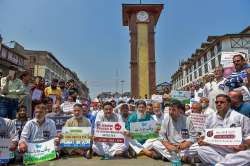Normal life affected in many parts of Kashmir Valley for second consecutive day following separatist shutdown over Article 35A
The two-day strike was given by the Joint Resistance Leadership (JRL), comprising Syed Ali Shah Geelani, Mirwaiz Umar Farooq and Mohammad Yasin Malik.

Life in Kashmir remained severely affected on Monday for the second consecutive day due to a complete shutdown called by separatists against the legal challenge in the Supreme Court on the validity of Article 35A.
The two-day strike was given by the Joint Resistance Leadership (JRL), comprising Syed Ali Shah Geelani, Mirwaiz Umar Farooq and Mohammad Yasin Malik.
Educational institutions, shops and business establishments remained closed across the Valley, while all kinds of transport remained off the roads due to the strike.
Officials said the security forces had been deployed at vulnerable places in the city and elsewhere in Kashmir for maintaining law and order. However, the officials said that the situation in the valley remained peaceful with no untoward incident reported from anywhere.
Life in Kashmir and Chenab valley remained affected following the protests. Protests were held at some places in Muslim-majority districts of this division today amid a general strike in support of Article 35A, which grants special rights and privileges to the citizens of Jammu and Kashmir. The strike, called by various social and religious organizations, disrupted the life in some areas of the twin border districts of Poonch and Rajouri along with Kishtwar, Doda and Ramban districts in the Chenab valley region, officials said.A shutdown called by local organisations also disrupted life in Kargil and adjoining areas in Ladakh region, the officials said.
Amarnath yatra was also suspended from Jammu in view of the two day separatist sponsored strike.A police official said the yatra was suspended from here as a precautionary measure in view of protests. A few hundred pilgrims camping in Jammu to join the yatra to the 3,880 metre high holy cave shrine of Amarnath in south Kashmir Himalayas were not allowed from the Bhagwati Nagar base camp this morning, the officials said.
Meanwhile, the Supreme Court on Monday adjourned hearing on a batch of pleas challenging the constitutional validity of Article 35-A, which gives special rights and privileges to people of Jammu and Kashmir, saying its three-judge bench has been hearing the case and will consider whether it has to be referred to a larger bench.
A bench comprising Chief Justice Dipak Misra and Justice A M Khanwilkar said the matter has to be heard by a three-judge bench and Justice D Y Chandrachud, who is also a part of the bench, was not present.
The apex court has listed the matter for hearing in the week commencing August 27.
CJI Misra observed that the apex court has to consider whether Article 35-A goes against the basic structure of the Constitution.
Article 35-A, which was incorporated in the Constitution by a 1954 Presidential Order, accords special rights and privileges to the citizens of Jammu and Kashmir and denies property rights to a woman who marries a person from outside the state.
The provision, which leads to such women from the state forfeiting their rights over property, also applies to their heirs.
The Jammu and Kashmir government had on August 3 moved the apex court seeking adjournment of today's hearing on petitions challenging the validity of Article 35-A, citing the upcoming local body elections.
During the hearing today, the counsel appearing for the petitioners challenging the validity of Article 35-A opposed the move by the state government seeking adjournment of the matter.
Several interlocutory petitions have been filed in support of Article 35-A by various individuals and civil society groups seeking continuance of the special status to Jammu and Kashmir.